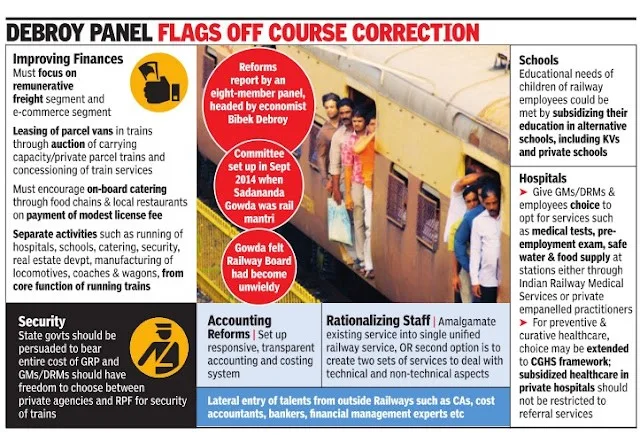Syllabus: GS3/ Infrastructure
In News
- The Bibek Debroy Committee 2015 report aimed to make Indian Railways economically viable and competitive, with a focus on decentralization, safety, and modernization, however, reforms are yet to be implemented completely.
Key Recommendations and Their Implementation
- Liberalisation of Indian Railways: Introduce private players to enhance competition and improve services.
- Implementation: Partially implemented. Some PPP projects have been initiated, but full-scale liberalization is yet to be undertaken.
- Empowering Railway Officials: Grant more autonomy to GMs and DRMs for decision-making.
- Implementation: Implemented. GMs and DRMs have been empowered to take independent decisions, leading to faster decision-making and improved efficiency.
- Overhaul of Accounting System: Implement accrual accounting to improve financial transparency and accountability.
- Implementation: Implemented. The Indian Railways has adopted accrual accounting.
- Establishment of Rail Development Authority (RDA): Create an independent regulator to oversee railway operations and promote competition.
- Implementation: Implemented. The RDA has been established to provide expert advice on pricing, non-fare revenue, and competition.
- Focus on Safety: Create a dedicated fund for safety-related investments.
- Implementation: Implemented. The Rashtriya Rail Sanraksha Kosh (RRSK) was established for safety upgrades with a ₹1 lakh crore fund.
- Recommended modern technology, exemplified by Vande Bharat trains and KAVACH systems.

Image Courtesy: TOI
Suggested Reading: Indian Railways and Safety Challenges
Source: IE
Previous article
Scheme for Strengthening the Medical Device Industry
Next article
Role of Technology in Modernising Fisheries Sector